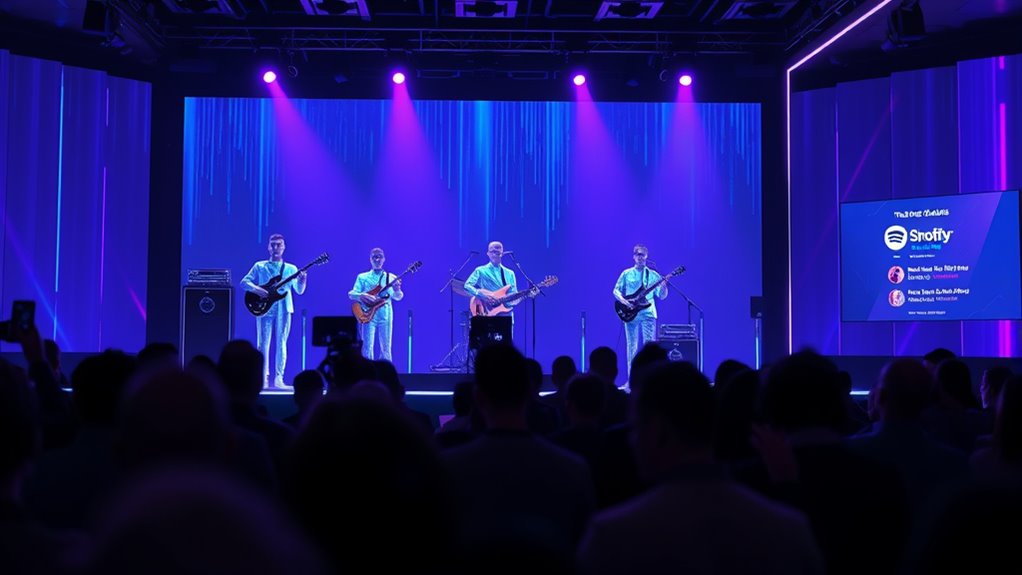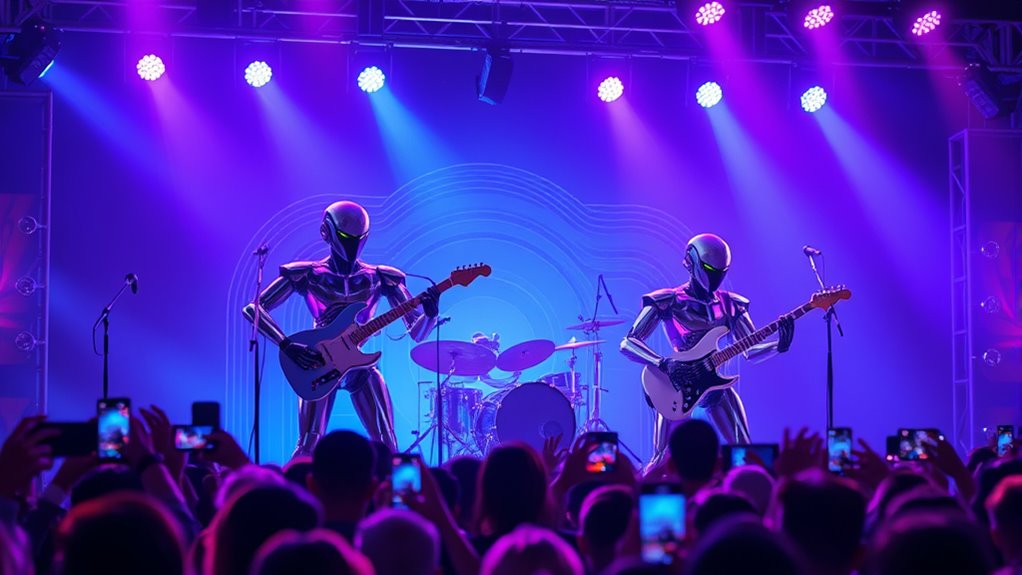A viral AI-generated band on Spotify has sparked a big debate about creativity, ethics, and copyright. As this virtual band gains popularity, industry insiders are calling for warning labels to clarify which tracks are AI-made. Concerns focus on AI training using copyrighted music without permission and questions about ownership and originality. If you want to understand how this situation could change the future of music and your listening experience, there’s more to explore.
Key Takeaways
- An AI-created band has gained massive popularity on Spotify, attracting millions of listeners with its seamless, catchy tracks.
- The rise of AI-generated music raises ethical concerns about copyright infringement and originality.
- The industry is advocating for warning labels to inform listeners that the music is entirely AI-produced.
- Debates focus on protecting artists’ rights and establishing clear ownership in AI-driven music creation.
- Calls for regulation emphasize transparency and responsible use of AI tools to ensure fair and ethical music consumption.

An AI-generated band has taken Spotify by storm, enthralling millions of listeners worldwide. Their catchy melodies and seamless production have caught the public’s attention, but behind the scenes, many are raising serious questions about AI ethics and copyright concerns. As you listen, it’s important to understand that these tracks are created entirely by artificial intelligence, often trained on existing music, which raises issues about originality and fair use. Critics worry that using AI in music blurs the lines of creative ownership, making it difficult to determine who truly holds the rights to these songs. This has sparked debates about copyright concerns, especially since some AI models are trained on copyrighted material without explicit permission from original artists. While the technology allows for innovative soundscapes and new musical expressions, it also puts artists’ rights at risk, as their work could be used without consent or proper attribution. The industry is now grappling with how to regulate these emerging AI tools to guarantee ethical use and protect intellectual property. Many artists and industry insiders feel that current copyright laws are outdated in the face of AI’s capabilities, prompting calls for new legislation or warning labels on AI-generated music. These warnings would serve to inform listeners that the music they’re enjoying might not be created by humans and could be built from a mix of copyrighted samples. The concern isn’t just about legality but also about transparency—listeners deserve to know whether they’re supporting human artistry or AI-driven production. As an active participant in the music scene, you might wonder how this impacts your listening experience. The rise of AI bands challenges traditional notions of creativity, forcing you to question what originality truly means in the digital age. It’s also a reminder that, with technological advances, ethical considerations should guide how these tools are used. The industry is calling for safeguards, including clear warning labels, so you can make informed choices. You might find yourself contemplating whether AI-generated music can evoke genuine emotion or if it’s simply a clever simulation. The conversation about AI ethics and copyright concerns isn’t going away; it’s evolving alongside this new wave of music. As you continue to enjoy these viral hits, remember that behind their catchy hooks are complex issues about ownership, authenticity, and the moral responsibilities of creators and platforms alike. The Spotify sensation is a glimpse into the future of music—one that demands careful thought about how technology shapes artistic expression and how we, as listeners, navigate this rapidly changing landscape. Additionally, the ethical use of AI in music is closely linked to the ongoing debate about copyright concerns and fair use policies.
Frequently Asked Questions
How Does the AI Band Generate Its Music?
You might wonder how the AI band generates its music. It uses advanced algorithms that mimic human creativity, enabling algorithmic creativity in music composition. You can think of it as the AI analyzing vast amounts of existing music to identify patterns and then creating new melodies, harmonies, and rhythms based on that data. This process allows the AI to produce unique tracks, showcasing how technology can innovate in music creation.
Are There Legal Restrictions on Ai-Created Music?
Imagine a storm of questions swirling around your head—are there legal restrictions on AI-created music? Yes, you should consider copyright concerns and licensing issues, as laws struggle to keep up with this new frontier. While AI can craft melodies effortlessly, legal frameworks haven’t fully adapted, leaving gray areas. This means you might face challenges securing rights or avoiding infringement, making it vital to stay informed about evolving regulations in AI-generated content.
Who Owns the Rights to Ai-Generated Songs?
You own the rights to AI-generated songs if you’re the creator or have authorized the AI’s use, but copyright disputes often arise because current laws don’t clearly define ownership. Licensing challenges also complicate matters, especially when multiple parties’ inputs are involved. To avoid legal issues, you should document your rights, seek licensing when needed, and stay updated on evolving regulations around AI-created content.
How Do Listeners Typically Respond to AI Band Music?
You might find yourself intrigued by AI band music, feeling a mix of listener nostalgia and curiosity. Many listeners respond positively, captivated by the emotional connection it creates, reminiscent of classic sounds. However, others may feel uneasy, questioning authenticity. Overall, your response varies, but you’re likely to experience a blend of fascination and skepticism, as AI-generated music taps into deep-seated feelings while challenging traditional notions of artistry.
What Are Future Plans for the AI Band’s Development?
You’re invited to join the AI band’s journey, where future plans focus on deepening creative collaboration while honoring AI ethics. They aim to enhance musical diversity and authenticity, blending human artistry with AI innovation. By embracing responsible development, you’ll see new features that foster transparency and trust. This evolving partnership promises to push musical boundaries, offering an exciting, harmonious future where technology and creativity dance seamlessly together.
Conclusion
You can’t ignore the seismic shift happening right now—an AI band skyrocketing to fame overnight, shaking the very foundations of the music world! As fans binge-listen and critics scramble, the industry’s calling for warning labels feels like a tidal wave about to engulf everything. This isn’t just a trend; it’s a full-blown revolution, changing how you’ll experience music forever. Buckle up—because what’s coming next will blow your mind!










